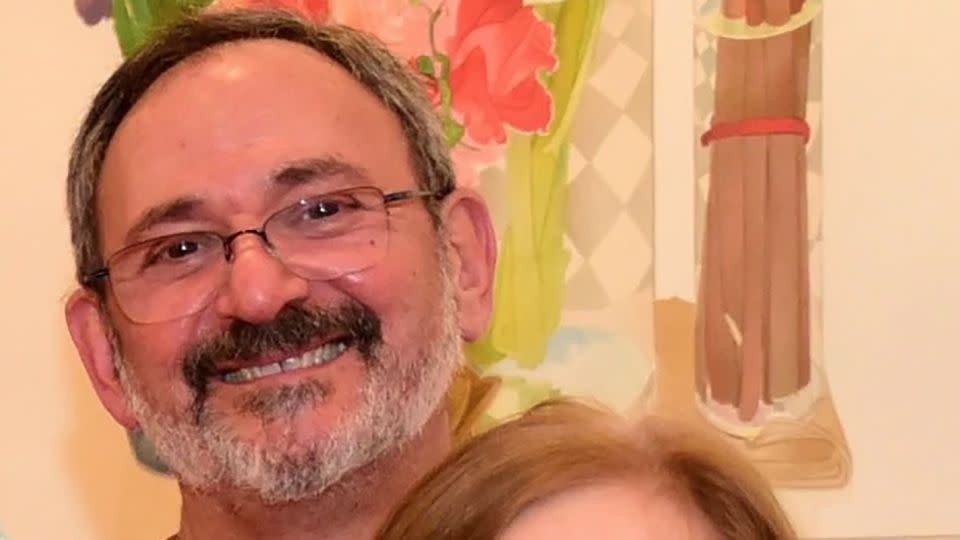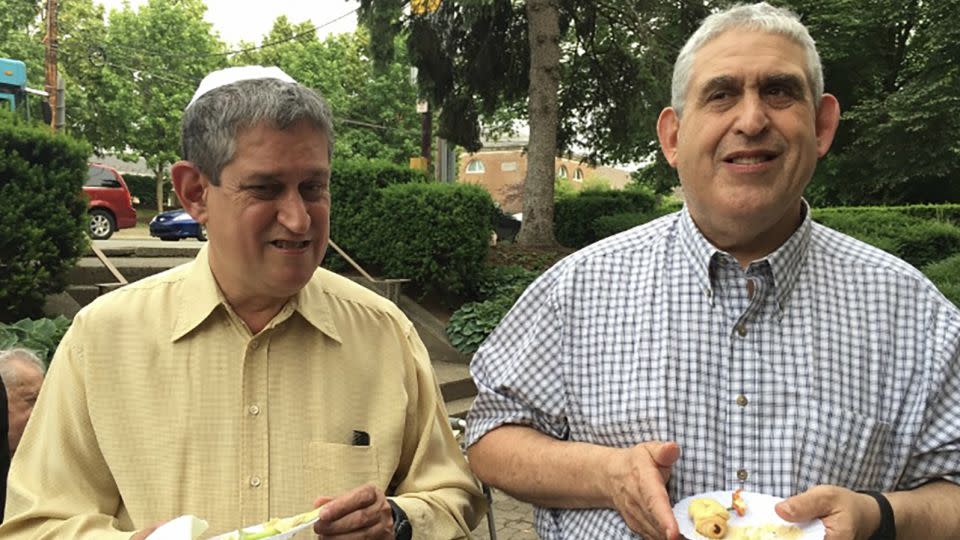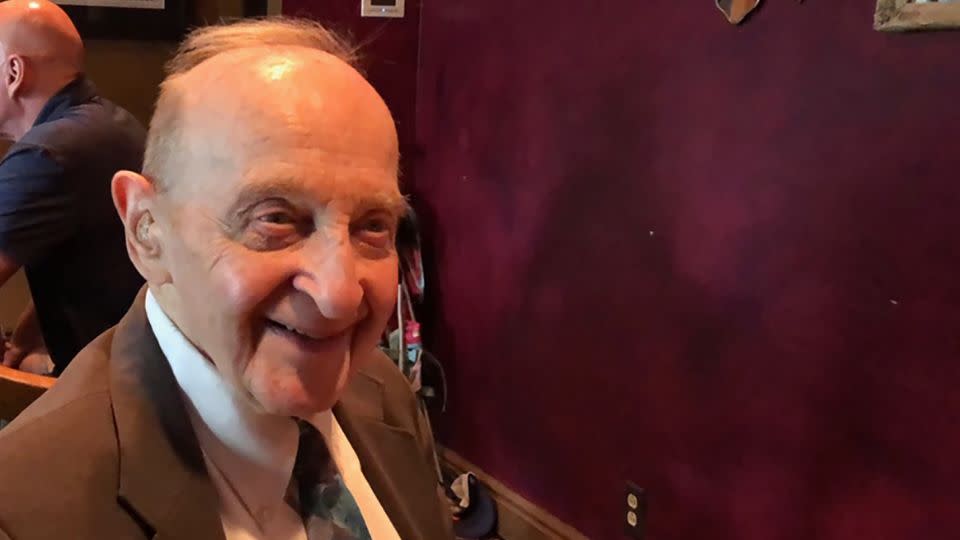Pittsburgh synagogue shooting trial reaches final death penalty sentencing stage
The final phase of the Pittsburgh synagogue gunman’s death penalty trial began Monday as prosecutors laid out why the shooter should be sentenced to death, including his continued lack of remorse in the attack that left 11 worshippers dead and six others wounded.
“He defiled a house of worship, turning it into a place of violence and death,” prosecutor Nicole Vasquez Schmitt said. “He made these decisions, and he is proud of them.”
“At the end of this trial, we will ask you to return a verdict of death, a verdict of justice,” she added. “The defendant made his decisions, and he must be held accountable.”
In contrast, defense attorneys for the gunman, Robert Bowers, emphasized his difficult upbringing and told jurors to follow their own moral code. They said a life sentence was enough of a penalty.
“The death penalty is never required – not in this case and not in any other case. It is each of you who decides Mr. Bowers’ fate,” defense attorney Elisa Long said. “You are never required to do violence to your own conscience or to surrender your own opinion. You are never required to fall in line with the views of others.”
The opening statements came as part of the third and final phase of this trial as the jury considers whether to sentence him to death. After openings, several family members of those killed testified about how losing their loved ones had impacted them.
Bowers, 50, was found guilty on June 16 of all 63 charges against him in the attack at Pittsburgh’s Tree of Life synagogue in October 2018, the deadliest ever attack on Jewish people in the United States. Twenty-two of those counts were capital offenses.
The jury further found he was eligible for the death penalty on July 13, moving the trial to this final sentencing stage.
The antisemitic mass killing began on a rainy Saturday morning when Bowers burst into the synagogue and began shooting people using an AR-15-style rifle. The synagogue was hosting three congregations that day, Tree of Life, Dor Hadash and New Light, for weekly Shabbat services.
The victims included a 97-year-old great-grandmother, an 87-year-old accountant and a couple married at the synagogue more than 60 years earlier.
Prior to the attack, the gunman spent years posting hateful comments about immigrants and Jewish people on Gab, a small social media platform used by far-right extremists. He criticized migrants as “invaders” and repeatedly disparaged the Hebrew Immigrant Aid Society, a non-profit providing support to refugees that had recently held an event with the Dor Hadash congregation.
Bowers further expressed his hatred for immigrants and Jews as he was being arrested and continued to defend his antisemitic beliefs in jailhouse interviews earlier this year, witnesses testified in the trial.
Prosecution, defense offer arguments for and against Robert Bowers’ death
Vasquez Schmitt, the prosecutor, started opening statements by telling jurors each of the 11 people killed was so much more than a victim.
“They were loved, they were unique, and they’ve left behind loved ones who had to endure the crushing weight of their loss,” she said. “You are going to learn about how they lived and how they loved and how much they are missed by those who loved them.”
The prosecution said they will prove additional aggravating factors, including victim impact, killings motivated by religious animus, selection of site, lack of remorse and injury to surviving victims.
Vasquez Schmitt asked the jury to give weight to the fact the defendant killed these victims because they belong to a particular faith and didn’t know them personally. He killed them because, as Bowers told psychologist Dr. Richard Rogers in an examination, “a Jew is a Jew is a Jew.”
Further, the prosecutor asked the jury to give Bowers’ lack of remorse immense weight.
She reminded them how Bowers, during the crime, had to step over dead bodies to continue his hunt for victims. Earlier this year, Bowers continued to state antisemitic beliefs to Dr. Rogers when he was examined, describing with pride what he said was the worst attack in antisemitic history. She reminded the jury that Bowers said, “I was pleased but I had a sense of disappointment,” because, he added, “I wish I had shot more.”
Addressing the defense claims that Bowers suffers from mental health issues, Vasquez Schmitt said that the defendant is not on any medication and does not hallucinate. “His beliefs on Jews are common beliefs shared by many … they are not delusions.”
“We will respond again to mental health claims if we have to,” Vasquez Schmitt added. “Use your common sense.”
Long, the defense attorney, argued Bowers’ childhood “was marked by chaos and abuse” that shaped his adult life.
“He came to believe that somehow killing these loved members of our community would right a perceived wrong,” Long said. “His life was shaped by circumstances.”
Long outlined how Bowers’ parents were unstable and violent and that his father attempted to kill himself by jumping off a boat and years later died by shooting himself in the chest with a rifle.
“An accumulation of negative life circumstances are likely to result in negative outcomes in adulthood, “Long said.
Bowers’ lawyer told the jury that a life sentence is much less of a factual determination, but a moral one. She urged the jury, “We ask each of you to look deep in your heart and conclude enough is enough.”
Victims’ family members mourn loved ones

Family members of some of the shooting victims took the stand Monday and gave impact statements.
Carol Black, whose brother Richard Gottfried was killed, shared details about his life and path from working as a UPS driver to ultimately becoming a dentist.
“I think because he had such a strong commitment to his faith and he was very, very family oriented. He loved his family, he loves his friends, he was such a valued member of the congregation,” Black testified.
Gottfried’s wife Margaret Durachko also took the stand and said they celebrated their 38th wedding anniversary one week before he was killed.
She told the jury about his passion for wine and hosting Sabbath dinner on Friday nights in their home. “He was happy to be seeing other people enjoy wine, and so he always wanted to have the right wine for the occasion,” she said. “I had to keep up with my culinary skills because he had such fabulous wine.”
She broke down in tears on the stand when a photo of her husband was shown climbing the steps of the Parthenon despite a recent knee injury. She spoke about “his incredible determination and stamina and his absolute lust for life.”
She shared that Gottfried and she never had any children and that meant he was her whole family.
“It was wiped out in a second,” Durachko testified.
She expected to spend the rest of her life with him.
“At least 30, expected to have at least 30 more years together,” Durachko said. “My whole world was turned upside down.”
Sister and mother of ‘The Boys’ offer emotional testimony

Diane Rosenthal, the sister of victims David and Cecil Rosenthal, testified about her brothers’ devotion to the Tree of Life synagogue.
Her brothers were diagnosed with an intellectual disability as children, but their parents refused to institutionalize them, saying it was important for the family to grow up together and for Diane and her sister to understand the disabilities that were out in the world, she said.
It wasn’t easy growing up together and there were some very difficult challenges, but “it was probably the best thing that happened to us as a family,” she said.
Cecil had a zest for life, was very social, and was always laughing, and David was very shy, but once he got to know someone, always wanted to be included. Diane Rosenthal said family rituals and faith were the two most important things for, “the boys,” as she and others at the Tree of Life synagogue referred to them.
Her parents, who are 85 and 91 years old, could not make it to the trial because they were not physically or emotionally able to be there. Diane said her brothers’ deaths “took a toll on both of them.”
Her mother, Margaret Joy Rosenthal, questioned how she was alive, and her sons weren’t. Diane Rosenthal said her parents gave 100% of themselves to her brothers, their lives were completely intertwined and revolved around “the boys.” They would never leave them.
Even when Cecil and David no longer lived with their parents, they arrived every Friday for Shabbat dinner, and stayed the weekend, Diane said, “The four of them were like a force.”
David who was “mom’s boy,” would go straight into the kitchen and help his mother cook and never let her do the dishes. Cecil would go straight to his father and ask questions about the family tree and how everyone was doing.
Diane Rosenthal said losing her brothers, “changed my life completely,” and “they were the glue that kept our family together.”
She said, “It left a huge hold in our hearts,” and not a day goes by where she doesn’t have a conversation about Cecil and David. “I know my parents cry every day. Every day,” she said.
In an emotional video played in court, Margaret Joy Rosenthal spoke about her two sons. She said raising them was difficult, but “we were rewarded by the joy of seeing them grow into unique individuals who were adored by the Squirrel Hill community.”
“You have never seen two more proud individuals when they have the opportunity to participate in the service in front of the congregation, and we felt so proud to be their parents,” she said.
On losing her sons, she cried as she said, “I can’t thank God enough for giving me Cecil and David as my sons, I couldn’t be more proud to be their mom, my only hope is may they rest in peace and may their memories be a blessing.”
Daughter of victim Melvin Wax speaks

Jodi Kart, the daughter of victim Melvin Wax, testified that her father “was the most content person that I believe I ever knew.” He never complained about anything. “He was happiest when he was with family.”
Her birthday was five days apart from her father’s, and on October 28, 2018, when Kart went to see her father’s apartment, she saw he had already purchased her birthday card. It was sitting on his table, and on it he wrote, ‘I love you very much.’ It was the last message she got from him, she testified.
Kart said her father was always lighthearted and very easygoing. People knew his obsession with jokes, and his library was full of joke books. He also kept a notebook, she discovered, with jokes written down.
Kart said losing her father was “devastating.” She explained the close relationship her son had with his grandfather, “he was his best buddy from day one.”
At age 15, Kart’s son underwent brain surgery and Melvin Wax was by his side every day, “just to be with him and help him keep (his) mind off pain and discomfort.”
Kart said her father, “never got to see our son graduate from college, he never got to see the first job that he got out of college.”
CNN’s Eric Levenson contributed to this report.
For more CNN news and newsletters create an account at CNN.com

